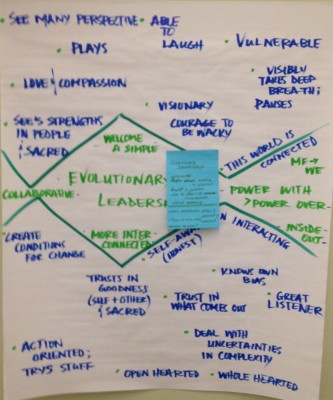o
There were many things that I learned last night. I learned them in the company of the group of 15 of us that gathered for the first session of “The Inner and Outer of Evolutionary Leadership.”
One of the questions that my colleague Kinde Nebeker asked of ourselves and the group was basic — “What is evolutionary leadership to you?” Thanks to Kinde’s idea, this question had a bit more nuance by inviting people to think of someone they would call an evolutionary leader, and from there begin to notice the qualities that that leader has.
We harvested a pretty good list of those qualities. You can see that in the picture above. However, as I was catching what people shared, I found myself wondering how this list was different from a list that we might have made 30, 50, or 100 years ago. So, I asked for second layer of harvest about what was different.
That’s the stuff in the middle, recorded in green. One that stuck with me was spoken by participant and friend Jane Holt, who I used to work with a bunch about five or six years ago through The Salt Lake Center for Engaging Community. “These qualities come from a value of ‘power with’ rather than ‘power over’.”
Good observations like that always send me into a mix of head-nodding ahas and awareness of questions that I want to ask the group. Questions that evoke story — When have you experienced power with rather than power over? What was that like for you? Questions that evoke relevance — What does that experience have to do with how we are together as a group (or team, or community, or committee, or…). Questions that evoke practice — What are one or two things you are committed to doing in the name of power with vs power over here?” It would be a great way to help set some agreements, right.
Evolutionary Leadership is a term that I’m continuing to come to learn a lot about. And like most terms, and learning about it, I find it best to approach that learning with some fluidity. Words matter. But they are just words. Just symbols and representatives of a meaning that sometimes can’t be found in words. Rather, a definition gives us something to be in relationship with. To center some noodling around and nibbling around to create an inner awareness, and if lucky, a practice.
“The world changes when a lot of people change a little bit,” said Willis Harman, mentor to one of my mentors. I feel very changed through little ways last night.





And then there is “power aming” which Tuesday is exploring plenty. I like power among because unlike power with, power for or power over it is a kind of power that does not reply on balancing an “us and them” relationship. It is a kind of power not determined on “othering” by rather dependant on “togethering” (if I can coin a term).
The struggle for the past 60 or more years in the social justice world is indeed transitioning from power over to power with, but it feel to me that power among is the radical evolutionary step. In canada I talk about THAT kind of power as what is availble to us when we enter into reconciliation. That kind of power may well be the BEST reason to enter into reconciliation together. Tuesday has a number of videos and writings on these ideas at her site http://www.tuesdayryanhart.com/
Thanks Chris — well put. Stirs me to the edges.